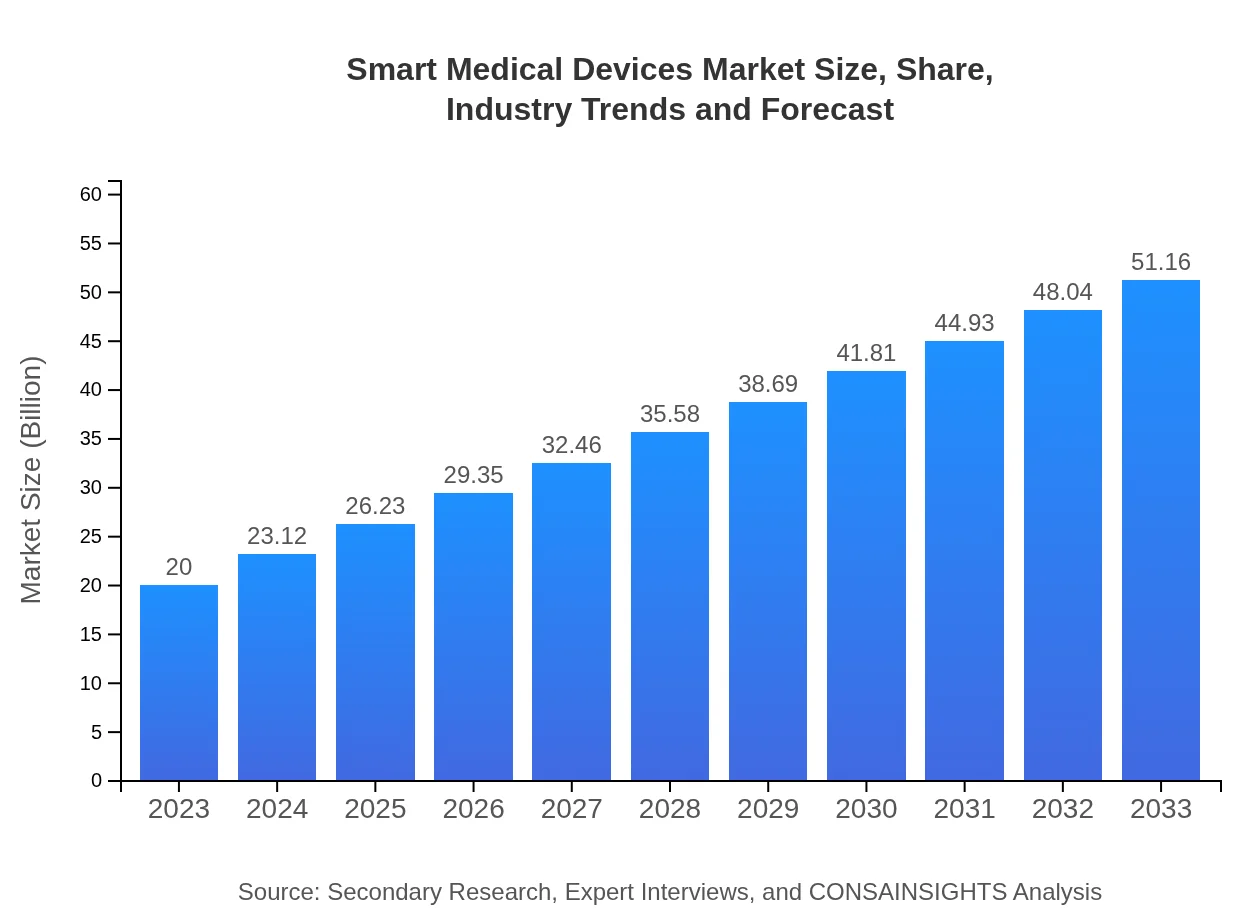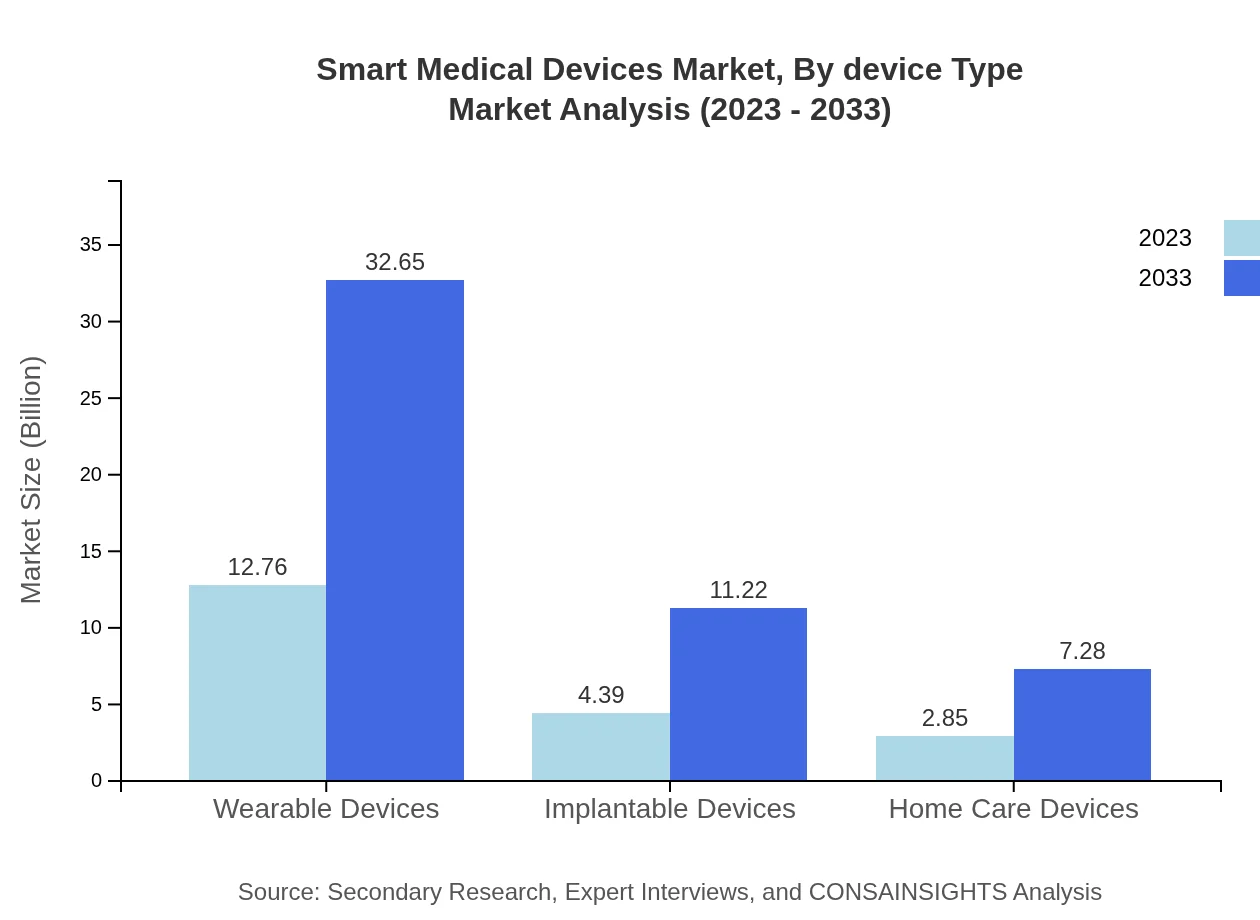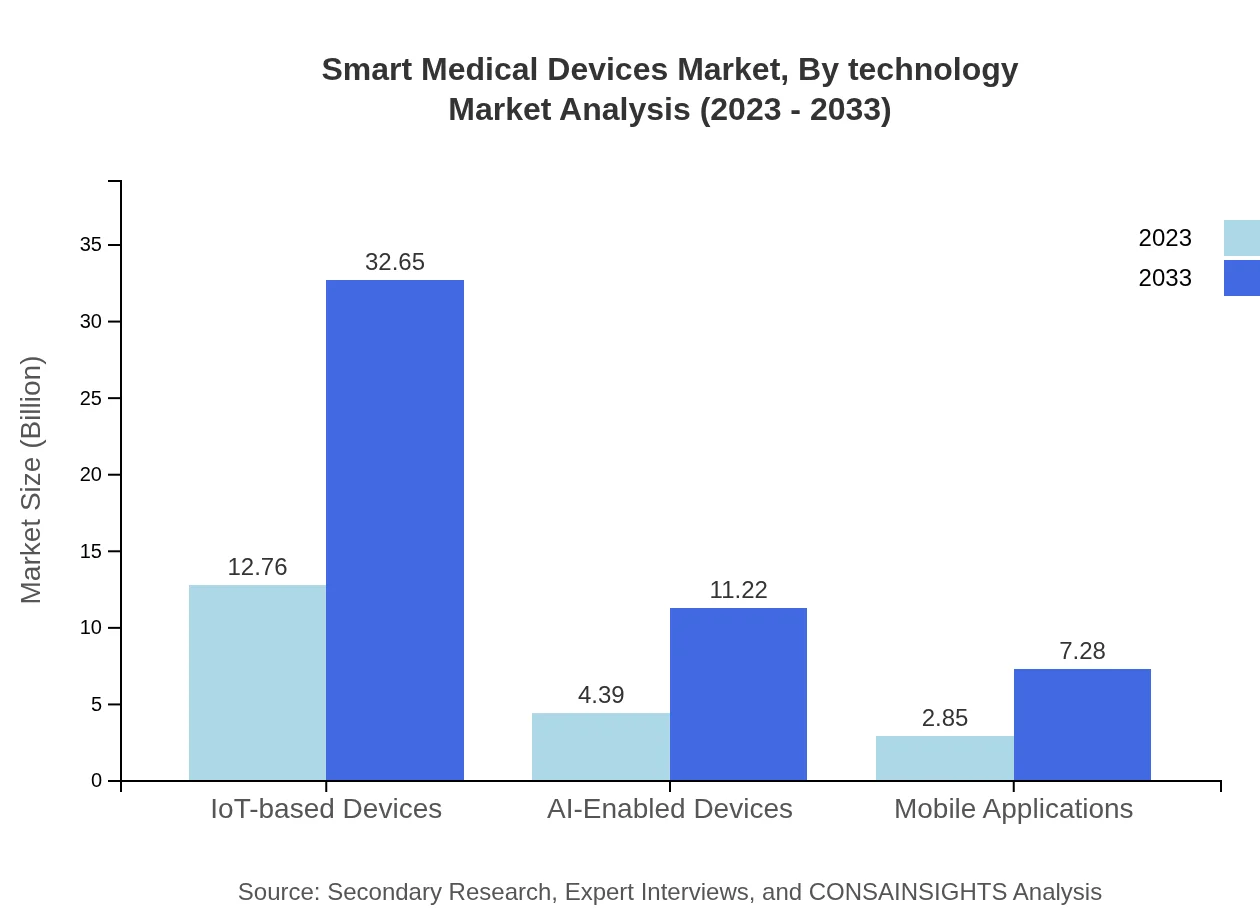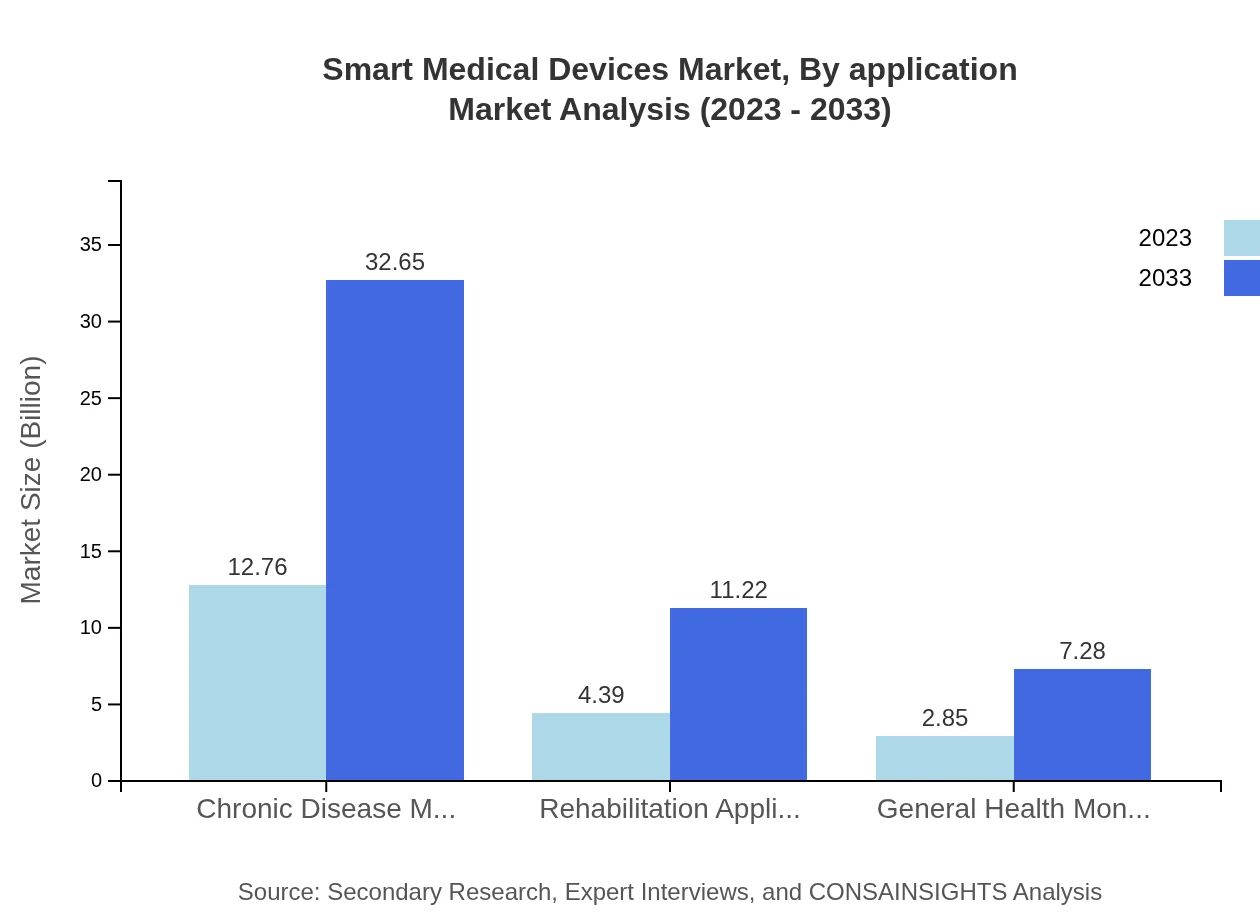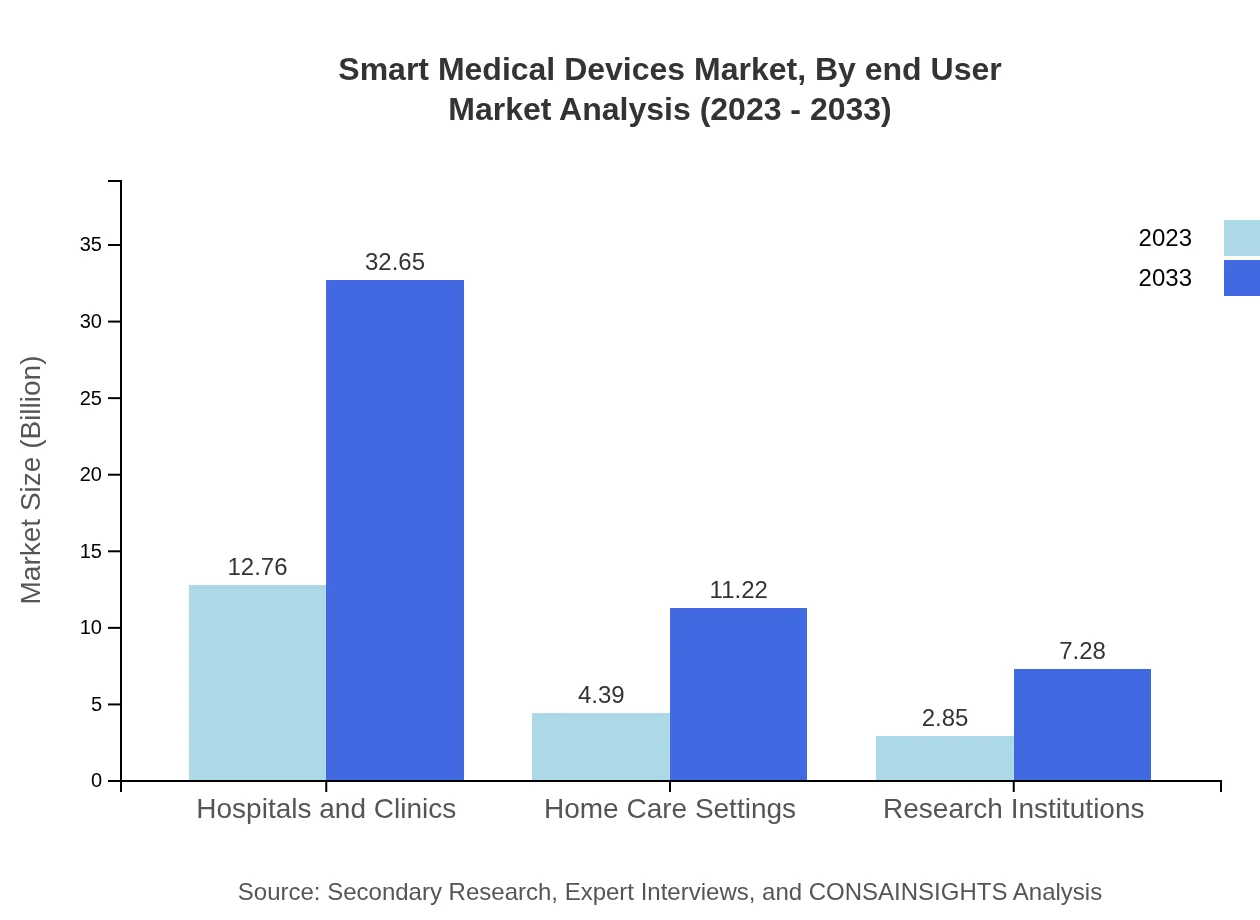Smart Medical Devices Market Report
Published Date: 31 January 2026 | Report Code: smart-medical-devices
Smart Medical Devices Market Size, Share, Industry Trends and Forecast to 2033
This report provides a comprehensive analysis of the Smart Medical Devices market, focusing on market trends, size, segmentation, and regional insights for the forecast period from 2023 to 2033.
| Metric | Value |
|---|---|
| Study Period | 2023 - 2033 |
| 2023 Market Size | $20.00 Billion |
| CAGR (2023-2033) | 9.5% |
| 2033 Market Size | $51.16 Billion |
| Top Companies | Medtronic PLC, Abbott Laboratories, Philips Healthcare, Boston Scientific Corporation |
| Last Modified Date | 31 January 2026 |
Smart Medical Devices Market Overview
Customize Smart Medical Devices Market Report market research report
- ✔ Get in-depth analysis of Smart Medical Devices market size, growth, and forecasts.
- ✔ Understand Smart Medical Devices's regional dynamics and industry-specific trends.
- ✔ Identify potential applications, end-user demand, and growth segments in Smart Medical Devices
What is the Market Size & CAGR of Smart Medical Devices market in 2023?
Smart Medical Devices Industry Analysis
Smart Medical Devices Market Segmentation and Scope
Tell us your focus area and get a customized research report.
Smart Medical Devices Market Analysis Report by Region
Europe Smart Medical Devices Market Report:
The European Smart Medical Devices market is expected to experience robust growth, scaling from USD 5.31 billion in 2023 to USD 13.58 billion by 2033. The demand for innovative healthcare solutions, coupled with supportive regulations, is driving advancements in smart device technology across the region.Asia Pacific Smart Medical Devices Market Report:
The Asia Pacific region is projected to witness exponential growth in the Smart Medical Devices market, with estimates indicating an increase from USD 3.89 billion in 2023 to USD 9.96 billion by 2033. The growth is driven by rising healthcare expenditure, government initiatives promoting advanced medical technologies, and increasing acceptance of digital health solutions among consumers.North America Smart Medical Devices Market Report:
North America holds the largest share of the Smart Medical Devices market, with an estimated size of USD 7.58 billion in 2023, projected to grow to USD 19.40 billion by 2033. This market expansion is attributed to the early adoption of advanced healthcare technologies, high healthcare spending, and the presence of leading medical device manufacturers.South America Smart Medical Devices Market Report:
In South America, the Smart Medical Devices market is expected to grow from USD 1.32 billion in 2023 to USD 3.37 billion by 2033. Factors contributing to this growth include the rising prevalence of chronic diseases, an expanding healthcare infrastructure, and increased investment in health technologies.Middle East & Africa Smart Medical Devices Market Report:
In the Middle East and Africa, the market for Smart Medical Devices is projected to increase from USD 1.89 billion in 2023 to USD 4.84 billion by 2033. This growth is fueled by improving healthcare infrastructure, government support for healthcare innovations, and increasing adoption of smart devices for enhanced patient care.Tell us your focus area and get a customized research report.
Smart Medical Devices Market Analysis By Device Type
In 2023, the Smart Medical Devices market for Hospitals and Clinics is expected to reach USD 12.76 billion, accounting for 63.82% of the total market share. This segment is projected to grow significantly to USD 32.65 billion by 2033. Home Care Settings represent a growing segment as well, anticipated to reach USD 4.39 billion in 2023, growing to USD 11.22 billion by 2033, with a stable market share of 21.94%. Research Institutions, although smaller, will see growth from USD 2.85 billion to USD 7.28 billion, holding 14.24% of the market share.
Smart Medical Devices Market Analysis By Technology
IoT-based Devices will dominate the market, expected to grow from USD 12.76 billion in 2023 to USD 32.65 billion by 2033. In 2023, AI-Enabled Devices will reach USD 4.39 billion, growing to USD 11.22 billion by 2033. Mobile Applications, vital for patient engagement, will increase from USD 2.85 billion to USD 7.28 billion.
Smart Medical Devices Market Analysis By Application
The Chronic Disease Management segment leads the market, projected to reach USD 12.76 billion in 2023 to USD 32.65 billion by 2033. Rehabilitation Applications will see growth from USD 4.39 billion to USD 11.22 billion, while General Health Monitoring is projected to grow from USD 2.85 billion to USD 7.28 billion.
Smart Medical Devices Market Analysis By End User
In 2023, the Health Insurers and Payers segment will comprise a significant part of the Smart Medical Devices market. As the integration of technology in healthcare continues to advance, it is expected to grow substantially over the forecast period.
Smart Medical Devices Market Trends and Future Forecast
Tell us your focus area and get a customized research report.
Global Market Leaders and Top Companies in Smart Medical Devices Industry
Medtronic PLC:
A leader in medical technology, Medtronic specializes in innovative therapies for chronic conditions, integrating advanced devices with data and technology.Abbott Laboratories:
Abbott is known for its wide range of medical devices, including diagnostics and monitoring systems that leverage smart technology to improve patient outcomes.Philips Healthcare:
Philips Healthcare focuses on improving patient care through advanced imaging and monitoring technologies, enhancing clinical workflows and health management.Boston Scientific Corporation:
Boston Scientific pioneers minimally invasive medical solutions and has made significant advances in smart medical technologies for heart and vascular treatments.We're grateful to work with incredible clients.









FAQs
What is the market size of Smart Medical Devices?
The smart medical devices market is valued at approximately $20 billion in 2023, with an anticipated CAGR of 9.5% from 2023 to 2033, indicating significant growth in this vital healthcare sector.
What are the key market players or companies in the Smart Medical Devices industry?
Key players in the smart medical devices industry include Philips Healthcare, Medtronic, Siemens Healthineers, Johnson & Johnson, and Abbott Laboratories, leading innovations in medical technology and smart device functionalities.
What are the primary factors driving the growth in the Smart Medical Devices industry?
Growth drivers in the smart medical devices sector include advancements in IoT technology, increasing health awareness, demand for remote patient monitoring, a rise in chronic diseases, and ongoing innovations in healthcare technology solutions.
Which region is the fastest Growing in the Smart Medical Devices market?
The North American region is the fastest-growing in the smart medical devices market, projected to increase from $7.58 billion in 2023 to $19.40 billion by 2033, driven by technological advancements and high healthcare expenditure.
Does ConsaInsights provide customized market report data for the Smart Medical Devices industry?
Yes, ConsaInsights offers customized market research reports for the smart medical devices industry tailored to your specific needs, providing in-depth analysis and insights on target markets and segments.
What deliverables can I expect from this Smart Medical Devices market research project?
Expect comprehensive deliverables including detailed market analysis, segmentation data, growth forecasts, competitive landscape insights, and regional market assessments tailored to assist strategic decision-making.
What are the market trends of Smart Medical Devices?
Current market trends in smart medical devices include increased integration of AI and machine learning, a focus on telehealth solutions, rising consumer demand for wearable devices, and advancements in home healthcare technologies.

